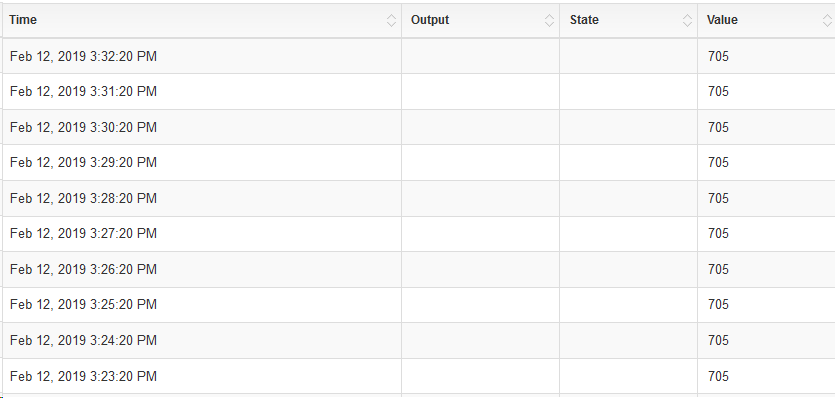| Section | ||||||||||||||||||||||||||||||||||
|---|---|---|---|---|---|---|---|---|---|---|---|---|---|---|---|---|---|---|---|---|---|---|---|---|---|---|---|---|---|---|---|---|---|---|
|
...
The ap_scanner is a data acquisition module which scans Wireless Access Points on the neighborhood.
interval
Mandatory parameter which defines the interval in milliseconds between each scan.
| unit | min | max | default |
|---|---|---|---|
milliseconds | 1000 ms | undefined | undefined |
timeout
Mandatory parameter which defines the maximum amount of time that the scan is allowed to run, in milliseconds.
| unit | min | max | default |
|---|---|---|---|
milliseconds | 1000 ms | undefined | undefined |
...
| Include Page | ||||
|---|---|---|---|---|
|
Example
| Code Block | ||||||
|---|---|---|---|---|---|---|
| ||||||
[data_store]
...
# default upload strategy (never, on_change, interval, always)
upload_strategy = interval
# upload interval to server in seconds
upload_interval = 60
... |
The SiteController.cfg is on default regarding the upload_interval (60s) and the upload_strategy (interval).
| Code Block | ||||
|---|---|---|---|---|
|
...
| |||
<?xml version="1.0" encoding="UTF-8" standalone="no"?>
<component_template config_version="1.0" schema_version="1.5.16-Aspirator">
<description>DA rest client</description>
<class>multi-sensor</class>
<vendor>azeti</vendor>
<version>1</version>
<sensors>
<!-- REST sensors -->
<sensor sensor_id="rest_temperatures_sensor/cooler">
<sensor_class>unknown</sensor_class>
<sensor_gateway sensor_gateway_id="rest_temperatures_gw">
<demux>
<keys>
<key>cooler</key>
</keys>
</demux>
</sensor_gateway>
</sensor>
<sensor sensor_id="rest_pressures_sensor/tire">
<sensor_class>unknown</sensor_class>
<upload>always</upload>
<sensor_gateway sensor_gateway_id="rest_pressures_gw">
<demux>
<keys>
<key>tire</key>
</keys>
</demux>
</sensor_gateway>
</sensor>
</sensors>
<devices>
<device device_id="rest_server">
<rest_client_device>
<host>http://192.168.118.26:7088</host>
<form_auth>
<uri>/rest/login.php</uri>
<form_data>
<form_key_value>
<pair_key>username</pair_key>
<pair_value>operator</pair_value>
</form_key_value>
<form_key_value>
<pair_key>password</pair_key>
<pair_value>LetMeIn</pair_value>
</form_key_value>
<form_key_value>
<pair_key>t</pair_key>
<pair_value>OK</pair_value>
</form_key_value>
</form_data>
<method>post</method>
</form_auth>
</rest_client_device>
<sensor_gateways>
<sensor_gateway publish_strategy="always" sensor_gateway_id="rest_temperatures_gw">
<rest_client>
<uri>/rest/temperature.php</uri>
<scheduling>
<polling_interval>15000</polling_interval>
<error_handling>
<retry retry_interval_before_alert="9000"/>
<timeout_handling>
<fixed_timeout>3000</fixed_timeout>
</timeout_handling>
</error_handling>
</scheduling>
</rest_client>
</sensor_gateway>
<sensor_gateway publish_strategy="always" sensor_gateway_id="rest_pressures_gw">
<rest_client>
<uri>/rest/pressure.php</uri>
<scheduling>
<polling_interval>15000</polling_interval>
<error_handling>
<retry retry_interval_before_alert="9000"/>
<timeout_handling>
<fixed_timeout>3000</fixed_timeout>
</timeout_handling>
</error_handling>
</scheduling>
</rest_client>
</sensor_gateway>
</sensor_gateways>
</device>
</devices>
</component_template>
|
In the example configuration above are 2 sensors configured, each with an own sensor gateway at the data acquisition device. Usually more then one sensors are using the same sensor gateway, which would be possible also here.Both sensor gateways are configured to have the publish_strategy always (default is on_change).
In the example configuration the sensor rest_pressures_sensor/tire is configured to have the upload_strategy always. The other sensor rest_temperatures_sensor/cooler remains with the default upload_strategy interval.
Both gateways of the device 'rest_server' emit their raw results all 15 seconds, regardless if there was a change in the values, because both gateways are configured with the publish_strategy="always"
The sensor rest_pressures_sensor/tire is configured with the upload strategy <upload>always</upload>. This way in the cloud the sensor data are present with a difference in their timestamps of 15 seconds.
The sensor rest_temperatures_sensor/cooler has no specific upload strategy in its configuration, so it uses the default upload strategy interval which is set to 60 seconds (see the Example snippet of the SiteController.cfg above). Herewith the sensor data are present in the cloud with a difference in their timestamps of 60 seconds.

